[VIDEO] Organoid technology: Ethical Challenges and Responsible Use
On 23 October 2024, the CHANGER EU project, in collaboration with BioMedLex, hosted a webinar titled Organoid Technology: Ethical Challenges and Responsible Use. The event delved into the ethical and legal considerations surrounding organoid research, a rapidly evolving field in modern biomedicine. This webinar was open to researchers of all disciplines, healthcare professionals, bioethicists, policy makers, students of all disciplines and anyone interested in the intersection of cutting-edge science and ethics.
Organoids are mini organs grown in the lab, that resemble human body organs and their physiology. They hold great promises for numerous applications in biomedicine and biotechnology, including alternatives for animal testing, disease modeling, organ development, precision and regenerative medicine. Despite their potential, organoids become increasingly complex and “lifelike”, raising serious ethical and, consequently, legal challenges. Any moral concerns need to be responsibly addressed, in order for this technology to be widely accepted and cover the pressing societal needs.
Aligned with the aim of the CHANGER project to explore new methodologies that can be used in the ethics review of research involving organoids, as well as with the aim of BioMedLex to provide accurate information on the legal and ethical dimensions of modern biomedicine, this thought-provoking webinar covered critical ethical and legal aspects of organoid research.
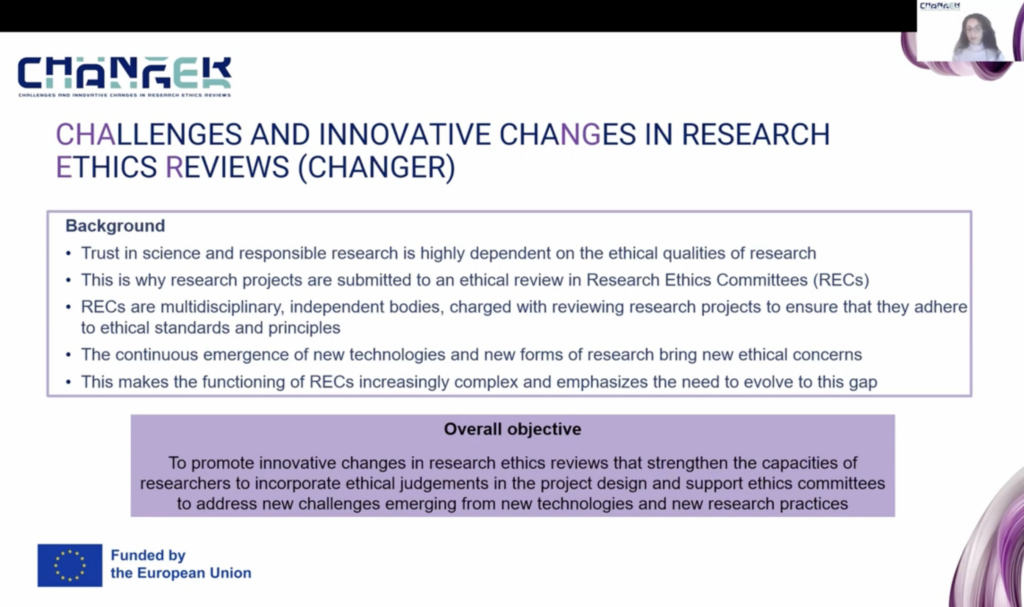
International scholars who are experts in the field provided their insights on the challenges of organoids and considerations for future research. In particular, the webinar covered the following main aspects: scientific developments for brain organoids, ethical challenges for brain organoids, and organoid intelligence. We also had the pleasure to see recently developed guidelines for the use of organoids in research and were informed about the community platform “Embassy of Good Science”.
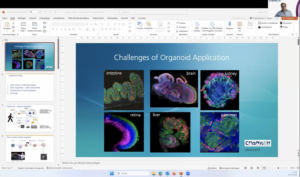
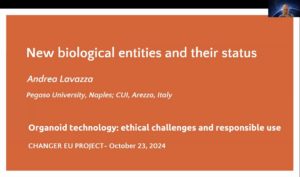
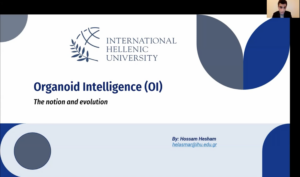
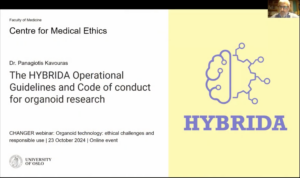
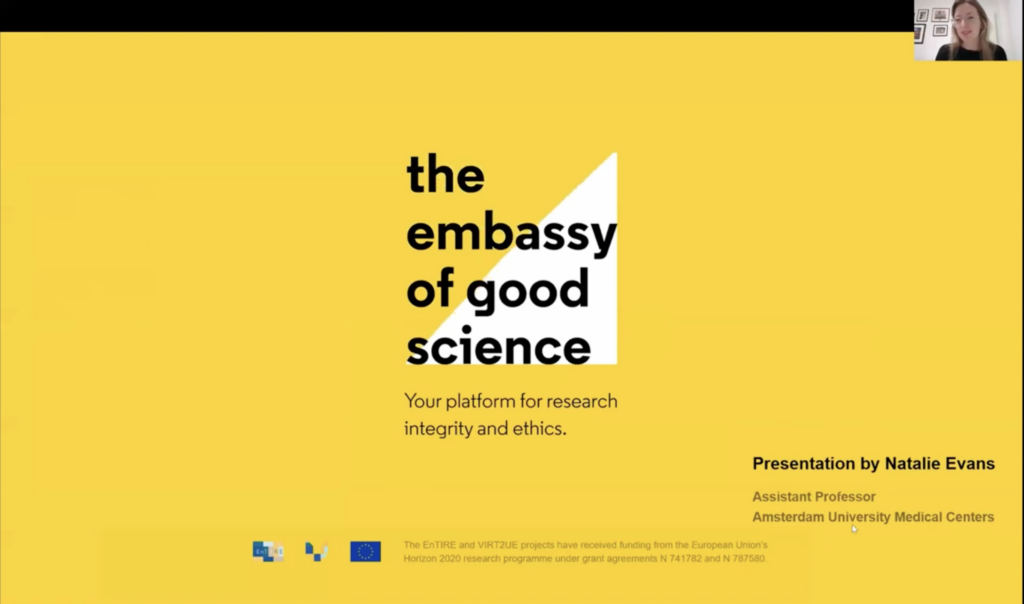
Watch the video:
Agenda of the webinar (click on the names to download presentations)
| Time | Title | Speaker |
|---|---|---|
| 17.00 – 17.10 | Welcome – About CHANGER | Vassiliki Mollaki |
| 17.10 – 17.35 | Challenges of organoid application | Andreas Kurtz |
| 17.35 – 18.00 | New biological entities and their status | Andrea Lavazza |
| 18.00 – 18.25 | The notion and evolution of Organoid Intelligence (OI) | Elasmar Hossam-Hesham-Ali |
| 18.25 – 18.35 | The HYBRIDA Operational Guidelines and Code of conduct for organoid research | Panagiotis Kavouras |
| 18.35 – 18.40 | Embassy of Good Science | Natalie Evans |
| 18.40 – 18.55 | Q & A session | All |
| 18.55 – 19.00 | Closing of the webinar | Vasiliki Mollaki |
Meet the speakers
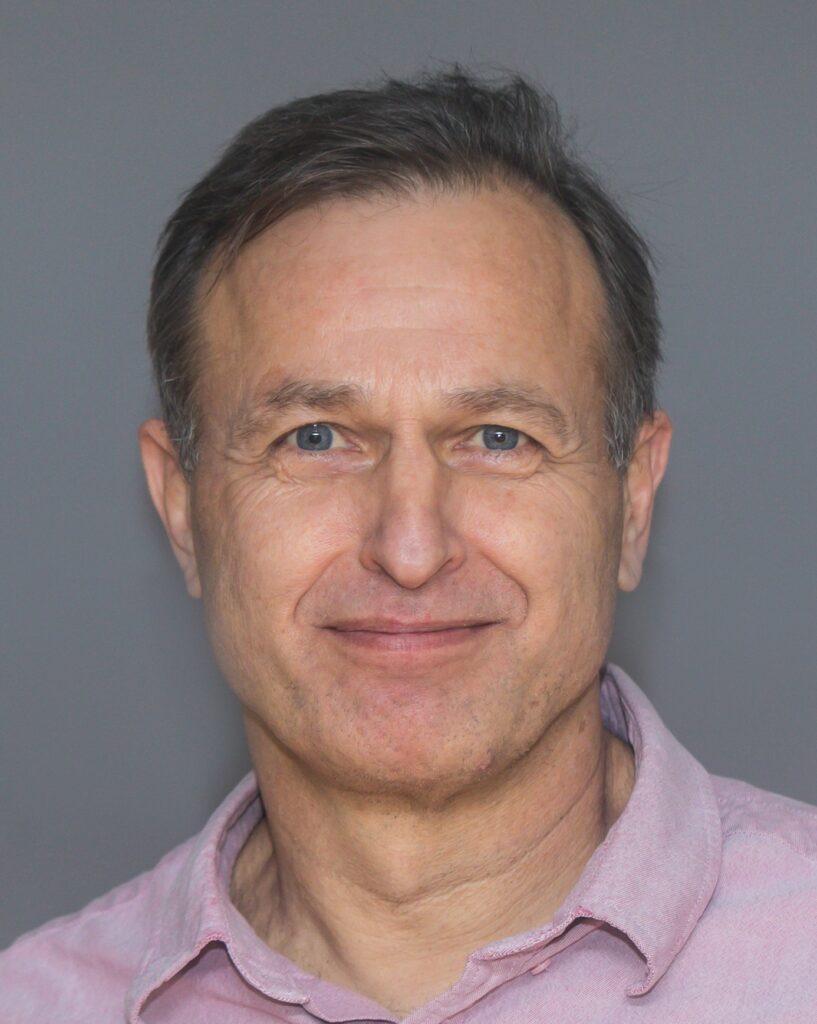
Andreas Kurtz – Fraunhofer Institute for Biomedical Engineering (IBMT), Berlin Institute of Health @ Charité, Center for Regenerative Therapies (BCRT) | Talk: Challenges of organoid application
Organoids derived stem cells reflect characteristics of the donor and are being used to model human tissues with increasing bodily complexity in single – or multiorgan applications. These models provide bodies of data that may together with medical information of donors form digital twins and are accessible to free modification and testing. The case was developed by focussing on brain organoids and how these may become embodied. The requirement to comparability and standardisation was also raised.
Dr. Kurtz received his Diploma in Genetics from Martin-Luther University and his PhD in Cell Biology from the Academy of Sciences in Germany. He worked as Assistant Professor at Georgetown and Harvard Universities before becoming Director of the German Stem Cell Authority in 2003. He is co-founding PI of the Berlin Center for Regenerative Therapies (BCRT) heading its Stem Cell Research Lab with a focus on pluripotent stem cell and organoid research; from 2009 to 2016 he joined the faculty of Seoul National University to establish a teaching program in cell biotechnology. In 2020, he joined Fraunhofer IBMT to further data related research and application in the stem cell field. His research concerns stem cell therapy and stem cell data management and ethics. He coordinates the European Stem Cell Registry (https://hPSCreg.eu) since 2010. From 2017-2021 he was member of the European Group of Ethics in Science and New Technologies at the European Commission and is member of the Bayer Bioethics Council since 2021.
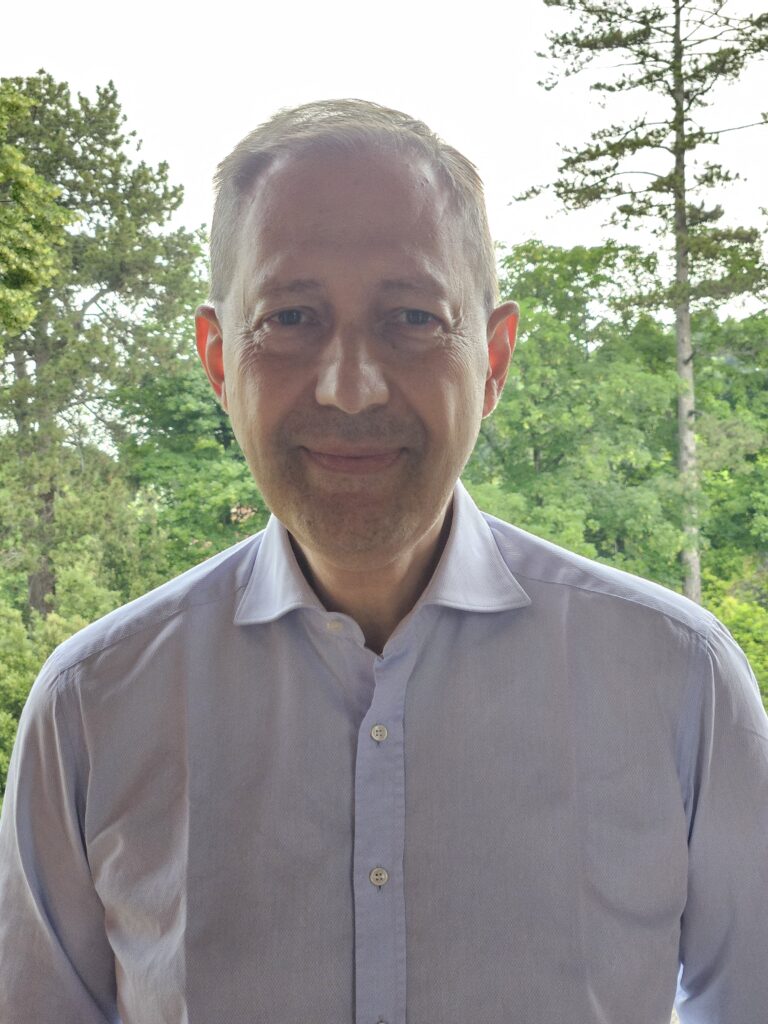
Andrea Lavazza – Associate Professor of Moral Philosophy at Pegaso University, Italy | Talk: New biological entities and their status
Brain organoids are biological entities in the lab mimicking an in vivo brain. As such, they could develop functions typical of an adult brain, sentience in the first place. Related to that possibility, other ethical concerns arise, concerning consent from donors and the use of organoids, but also issues like the economic aspects… All of that were addressed from an ethical standpoint.
Andrea Lavazza is an associate professor of Moral Philosophy at Pegaso University, Italy. His research focuses on the ethics of new technologies, and neuroethics specifically. He has recently been included in the Stanford/Elsevier’s Top 2% Scientist List 2024.
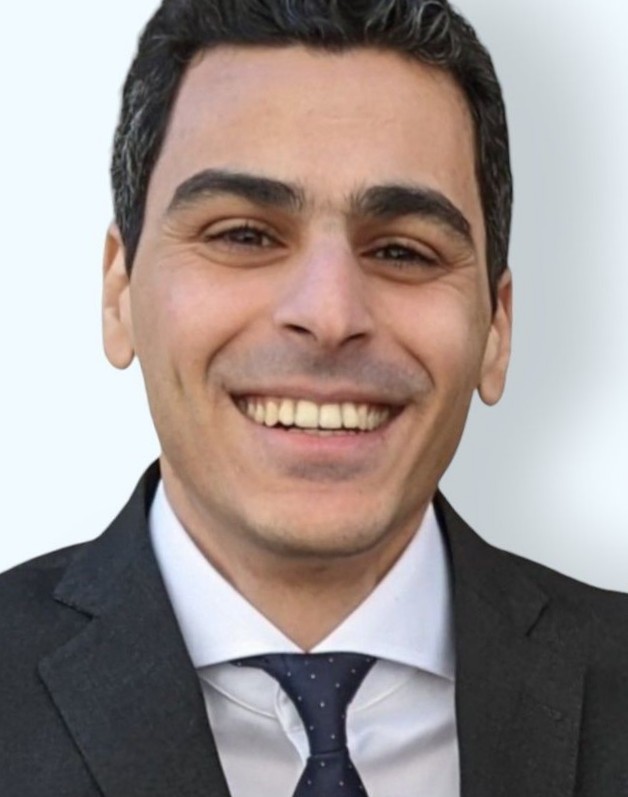
Elasmar Hossam-Hesham-Ali – Legal Professional and an MSc candidate in Bioeconomy, Biotechnology, and Law at the International Hellenic University in Thessaloniki, Greece | Talk: The notion and evolution of Organoid Intelligence (OI)
With the rapid advancement of supercomputers and the ongoing debate about the accelerating Artificial Intelligence (AI) arms race propelling us toward Artificial General Intelligence (AGI), Elasmar Hossam-Hesham-Ali intended to explore why researchers are now investigating intelligence systems inspired by human brain-like structures derived from brain cells. This discussion highlighted the primary goal of Organoid Intelligence (OI): to leverage the computational capabilities of biological neural networks to develop new forms of intelligence and biocomputing. Additionally, Elasmar Hossam-Hesham-Ali considered the limitations of current approaches that attempt to recapitulate human intelligence, also compared OI with neuromorphic computing and traced the evolution of Organoid Intelligence from its inception to the present.
Hossam Hesham is a legal professional and an MSc candidate in Bioeconomy, Biotechnology, and Law at the International Hellenic University in Thessaloniki, Greece.
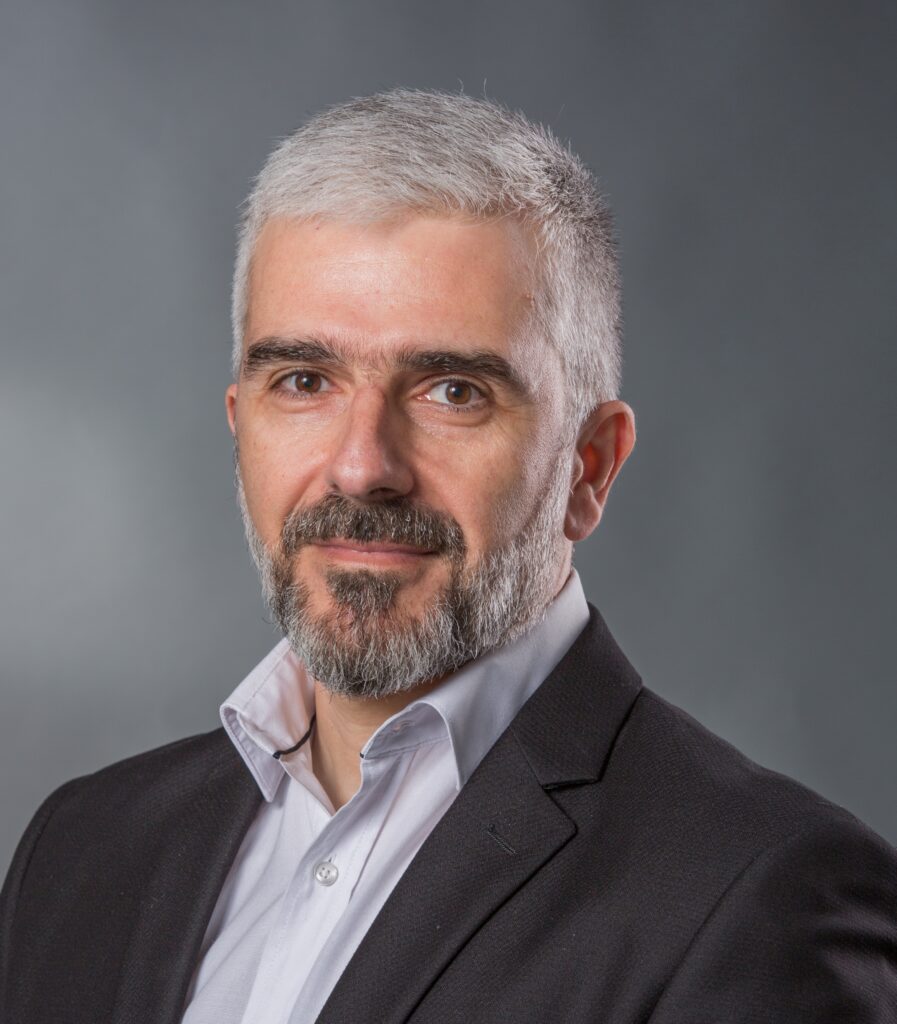
Panagiotis Kavouras – Institute of Health and Society, Centre for Medical Ethics, Faculty of Medicine, University of Oslo | Talk: The HYBRIDA Operational Guidelines and Code of conduct for organoid research
HYBRIDA project, by addressing three types of uncertainties, pertinent to organoid research aimed at developing a comprehensive guidance framework for organoid research and organoid-related technologies. The presentation provided a short overview of: (a) the Operational guidelines, which contained a comprehensive set of recommendations to organoid researchers, designed to streamline certain working procedures according to best practices and (b) the Code of Responsible Conduct for researchers, which suggests ethical standards of good practice to guide organoid researchers.
Panagiotis Kavouras is a senior researcher at the School of Chemical Engineering, National Technical University of Athens and a researcher (20% position) at the Institute of Health and Society, Centre for Medical Ethics, Faculty of Medicine, University of Oslo. Panagiotis Kavouras is a physicist, with an MSc and a PhD in Physics. For several years he had been involved in research on the synthesis of glass-ceramic materials with tailored properties and on the characterisation of physical and engineering properties of various types of materials. During the last seven years he has been focused on research integrity through his participation in several relevant EU-funded projects.
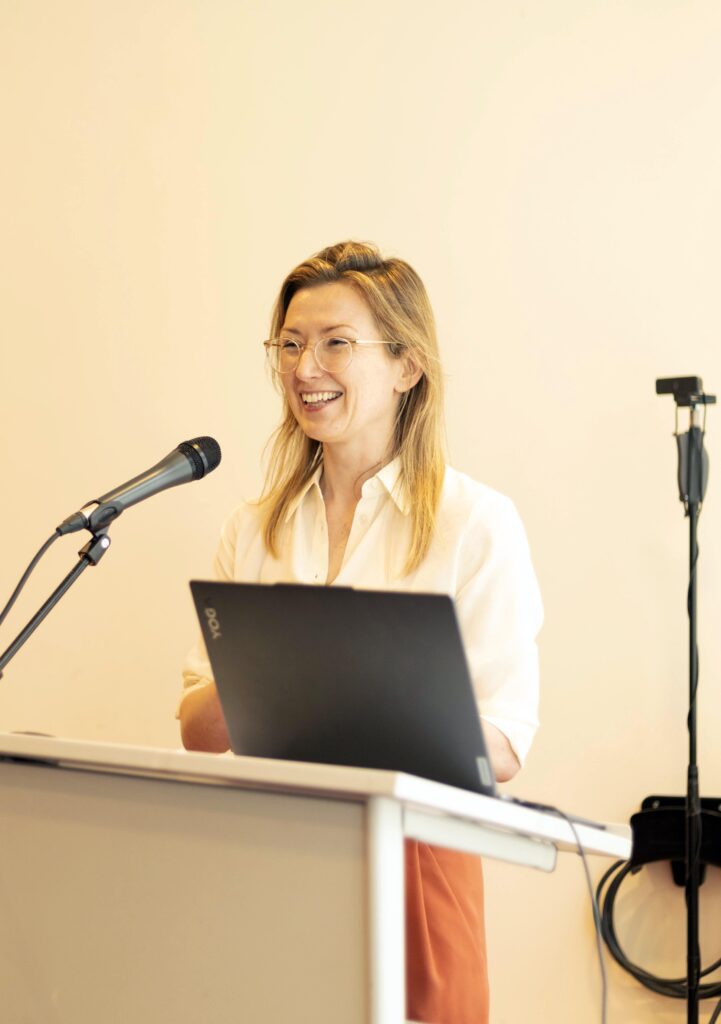
Natalie Evans – Senior Social Scientist, Co-Founder of the Embassy of Good Science | Talk: The Embassy of Good Science
The Embassy of Good Science aims to improve research integrity and research ethics by offering an online, open, ‘go-to’ platform, which brings together information on research integrity and research ethics and makes that information accessible, understandable, and appealing. It effectively organises and describes research integrity and research ethics guidelines, educational materials, cases, and scenarios. The Embassy is wiki-based, allowing users to add — when logged in with their ORCID researcher id — new information, and update and refine existing information.
Natalie Evans is a Senior Social Scientist with a background in public health and anthropology and an enduring interest in ethics and research integrity. Her research interests lie in how responsible research practices are conceptualised and communicated within academic communities. In the last five years, she has led stakeholder engagement activities for the PREPARED and ENTIRE projects and was the Scientific Coordinator for the successful VIRT2UE project, which developed a research integrity programme from a virtue ethics perspective and trained nearly 500 trainers, and 4000 researchers, across Europe. Through VIRT2UE, Natalie has trained research integrity trainers from Europe, Africa, and North America. Natalie is Co-Founder of the Embassy of Good Science and leads the Research Integrity Programme within the Department of Ethics, Law and Humanities.
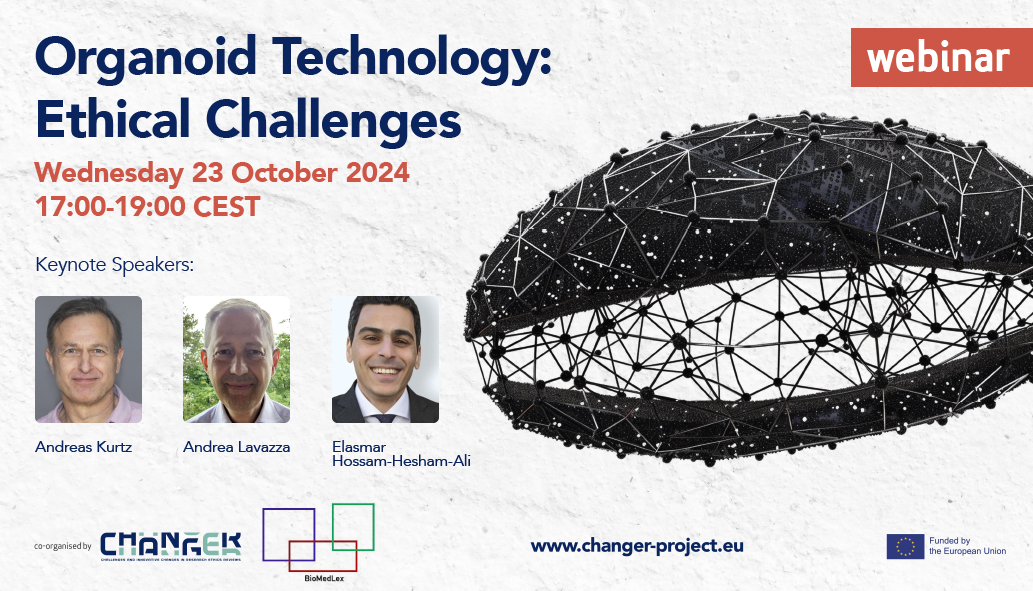
CHANGER – CHAllenges and innovative chaNGes in research Ethics Reviews is a three-year Coordination and Support Action (CSA) project, funded by the European Union’s Horizon WIDERA programme aiming to promote changes in research ethics reviews by strengthening the capacities of researchers to incorporate ethical judgements in the project design and implementation, and by supporting capacity building of Research Ethics Committees (RECs) to address new challenges posed by new technologies and new research practices.

